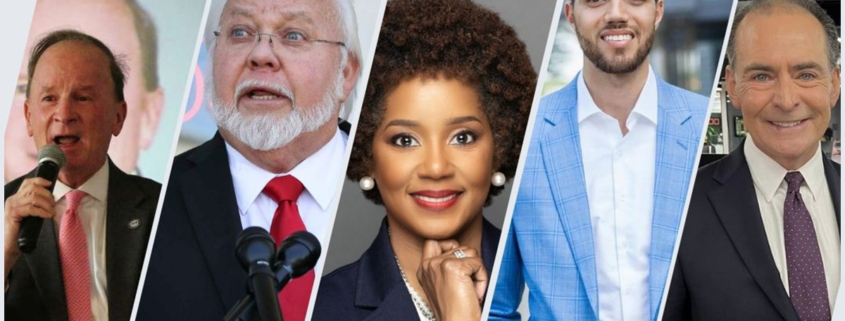Why Are So Many People Running for Houston Controller?
The campaign for Houston Controller, often sleepy and overshadowed by the mayor’s contest, is getting more attention this year. With the city’s ever-pressing financial issues and a host of well-known candidates making the claim that they are best suited to be the watchdog of the finances of the nation’s fourth largest city, the race is shaping up to be more engaging than it has in recent years.
Council Member Dave Martin, longtime chair of the city’s Budget and Fiscal Affairs Committee, is term-limited and running for Controller as is Council Member Michael Kubosh. Both candidates were among the first to announce their candidacies at the start of the year.
After Congresswoman Sheila Jackson Lee announced her campaign for mayor, Chris Hollins moved from the mayor’s race and entered the race for Controller, but not before Chief Deputy City Controller Shannan Nobles announced her candidacy. And the most recent entrant was Orlando Sanchez, who in 2019 ran for the position against current Controller Chris Brown.
With this office often overlooked, some might ask why so many people are vying for the position.
The Controller’s Office has long been seen as a natural stepping stone to the Mayor’s Office, both former Mayors Kathy Whitmire and Annise Parker followed that path. But, the City Controller, like State Comptroller except spelled correctly, is the chief watchdog for the city of Houston and if its powers are used effectively it can serve as the taxpayers’ counterbalance to the mayor and city council.
Houston’s Controller is responsible for the city’s comprehensive annual financial audit, performance and departmental audits, certifying city funds ahead of financial commitments made by the mayor and council, and making payments on behalf of the city, to name a few of the functions.
The Controller, with the City’s Finance Director, also compiles and presents a monthly finance report before council. It has been during these presentations that Controller Brown has taken the opportunity to draw public attention to budget deficits, under-staffing in his office, imbalanced budgets, and long-term financial implications of decisions made by Council and the Mayor.
That is largely where the power of the Controller resides, in using the platform to draw attention to fiscal issues.
But the issue has often been that if the Controller’s office finds itself at odds with the Mayor, they run the risk of future budget cuts limiting the Controller’s ability to fully execute its duties.
During the 2023 budget cycle, Council Member Amy Peck attempted to pass a budget amendment increasing audit staff in the Controller’s office but it was shut down by the mayor. This came after the Controller repeatedly spoke out about looming budget deficits that made the city’s already unstable financial situation even worse.
Some might recall during Controller Brown’s first week in office, he held up Houston airport system contracts by refusing to certify funds and forced a relook which he says saved “several hundred million” dollars in public funds.
There was also the proposed tax increase immediately post-Hurricane Harvey. The Mayor wanted to use the emergency disaster declaration provision allowing him to increase taxes on residents, the Controller called out the Mayor’s calculation and ultimately blocked it and instead got a tax reduction.
Whoever takes the office will have to oversee things like what will come of city finances after American Rescue Plan funding runs out and the outcome of the city’s collective bargaining with the Houston Firefighters, so the office has a lot to offer taxpayers and shouldn’t be an afterthought this November.
Charles Blain is the president of Urban Reform and the Urban Reform Institute, both of which focus on researching and promoting free-market policies to foster upward mobility for those living in major metro areas. Blain has been published in the Wall Street Journal, City Journal, Forbes, the Houston Chronicle, the Hill, Wired, and HuffPost. He serves on the governing board of the Prison Entrepreneurship Program and the boards of Texas Families First, Good Policy Society, and Entre Capital, a commercial lender for businesses started by ex-offenders. In September 2021, Blain was appointed to a four-year term to the Texas Advisory Committee to the US Commission on Civil Rights.









 Gage Skidmore, used under CC 2.0 License
Gage Skidmore, used under CC 2.0 License